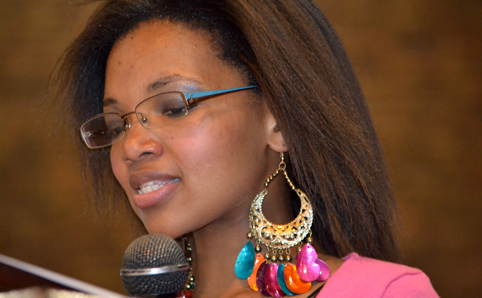Latest News Archive
Please select Category, Year, and then Month to display items
04 April 2024
|
Story Lunga Luthuli
|
Photo SUPPLIED
 Dr Juliet Kamwendo champions gender-inclusive climate action in Africa. Her expertise at the recently held AFR100 workshop highlighted vital steps towards sustainable and equitable development.
Dr Juliet Kamwendo champions gender-inclusive climate action in Africa. Her expertise at the recently held AFR100 workshop highlighted vital steps towards sustainable and equitable development.
Dr Juliet Kamwendo, Lecturer and Programme Director for Gender Studies in the Centre for Gender and Africa Studies at the University of the Free State, is spearheading efforts to integrate gender considerations into Africa's climate restoration agenda. Reflecting on her involvement, Dr Kamwendo stated, "This is particularly crucial, as women make up almost 50% of the population in Africa, and the depletion and degradation of land affect them disproportionately."
She recently served as a gender expert at the AUDA-NEPAD AFR100 workshop in Ouagadougou, Burkina Faso, from 25 to 29 March 2024. This initiative aims to restore forests and degraded land across Africa by 2030, with a focus on gender equality.
The workshop emphasised the integration of gender perspectives into the AFR100 project, acknowledging the disproportionate impact of land degradation on women. Dr Kamwendo's expertise highlighted the need to empower women in climate change interventions, addressing existing gender inequalities exacerbated by environmental degradation.
“Women – who are primarily responsible for household food security and water provision – bear the brunt of environmental degradation, leading to increased workloads, reduced income opportunities, and heightened vulnerability to climate-related disasters. Furthermore, the loss of forest cover and biodiversity further exacerbates the challenges faced by women, particularly in rural areas where they depend heavily on natural resources for their livelihoods,” added Dr Kamwendo.
Her participation highlights academia's crucial role in fostering inclusive and sustainable development, emphasising interdisciplinary collaboration to tackle complex environmental challenges. Through initiatives such as AFR100, stakeholders are working towards a more resilient and gender-responsive future for Africa.
Beyers Naudé challenge still stands – Dr Allan Boesak
2011-09-14
|

|
|
Dineo Babili, a first-year Foundation-phase Education student, reading out her winning essay during the final Beyers Naudé Memorial Lecture held last Friday. Dineo and Siphesihle Mavundla (poetry) both won R3 000,00 each from Kagiso Trust.
Photo: Thabo Kessah
|
The eighth Annual Beyers Naudé Memorial Lecture Series reached its climax with the third and last lecture being presented by Dr Allan Boesak at our Qwaqwa Campus on Friday, 9 September 2011. The first two lectures were presented by our Vice-Chancellor and Rector, Prof. Jonathan Jansen, and Prof. Kwandiwe Kondlo who heads our Centre for Africa Studies, respectively.
In his address, Dr Boesak posed hard-hitting questions, such as ‘'What kind of society do we want to be? At what price are we willing to sell the noble history of the struggle, the ideals and hopes of our people, the meaning of the freedom we sacrificed for?'’ He spoke fondly of his former friend and colleague who had appealed to the government of the day in 1973 to understand that the future security of our country did not lie with a consensus of white opinion, but rather ‘'a consensus of white and black opinion'’.
Dr Boesak said that Oom Bey had asked white people ‘to speak and act before it was too late’ and that he appealed to black people to prepare for the day on which they would be truly free.
‘'That was his hope. When he died, democracy had come, but this hope had not been realised and today we are in serious danger of losing it altogether. We have the matchless Freedom Charter; we have a most progressive Constitution; we have an impressive body of laws and we have enviable policy positions. However, the challenge from Beyers Naudé still stands and it comes to a new generation: it is time to transform words into deeds. The time for pious talk is over,'’ said Dr Boesak.
The lecture was well received by students and staff, as well as leaders and representatives from various sectors in the community. Learners and educators from a number of schools in the region also attended. Next year’s series will be hosted on the South Campus in Bloemfontein.